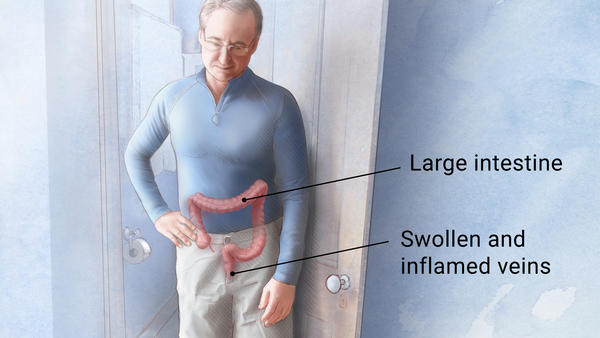
Haemorrhoids are swollen blood vessels in or around the anus and rectum. The haemorrhoidal veins are located in the lowest part of the rectum and the anus. Sometimes they swell so that the vein walls become stretched, thin, and irritated by passing bowel movements. Haemorrhoids are classified into two general categories: internal and external.
Internal haemorrhoids lie far enough inside the rectum that you can't see or feel them. They don't usually hurt because there are few pain-sensing nerves in the rectum. Bleeding may be the only sign that they are there. Sometimes internal haemorrhoids prolapse, or enlarge and protrude outside the anal sphincter. If so, you may be able to see or feel them as moist, pink pads of skin that are pinker than the surrounding area. Prolapsed haemorrhoids may hurt because they become irritated by rubbing from clothing and sitting. They usually recede into the rectum on their own; if they don't, they can be gently pushed back into place.
Anyone at any age can be affected by haemorrhoids. They are very common, with about 50% of people experiencing them at some time in their life. However, they are usually more common in elderly people and during pregnancy. Researchers are not certain what causes haemorrhoids. "Weak" veins - leading to haemorrhoids and other varicose veins - may be inherited.
It's likely that extreme abdominal pressure causes the veins to swell and become susceptible to irritation. The pressure can be caused by obesity, pregnancy, standing or sitting for long periods, straining on the toilet, coughing, sneezing, vomiting, and holding your breath while straining to do physical labour.
Diet has a pivotal role in causing - and preventing - haemorrhoids. People who consistently eat a high- fibre diet are less likely to get haemorrhoids, but those who prefer a diet high in processed foods are at greater risk of haemorrhoids. A low-fibre diet or inadequate fluid intake can cause constipation, which can contribute to haemorrhoids in two ways: it promotes straining on the toilet and it also aggravates the haemorrhoids by producing hard stools that further irritate the swollen veins.